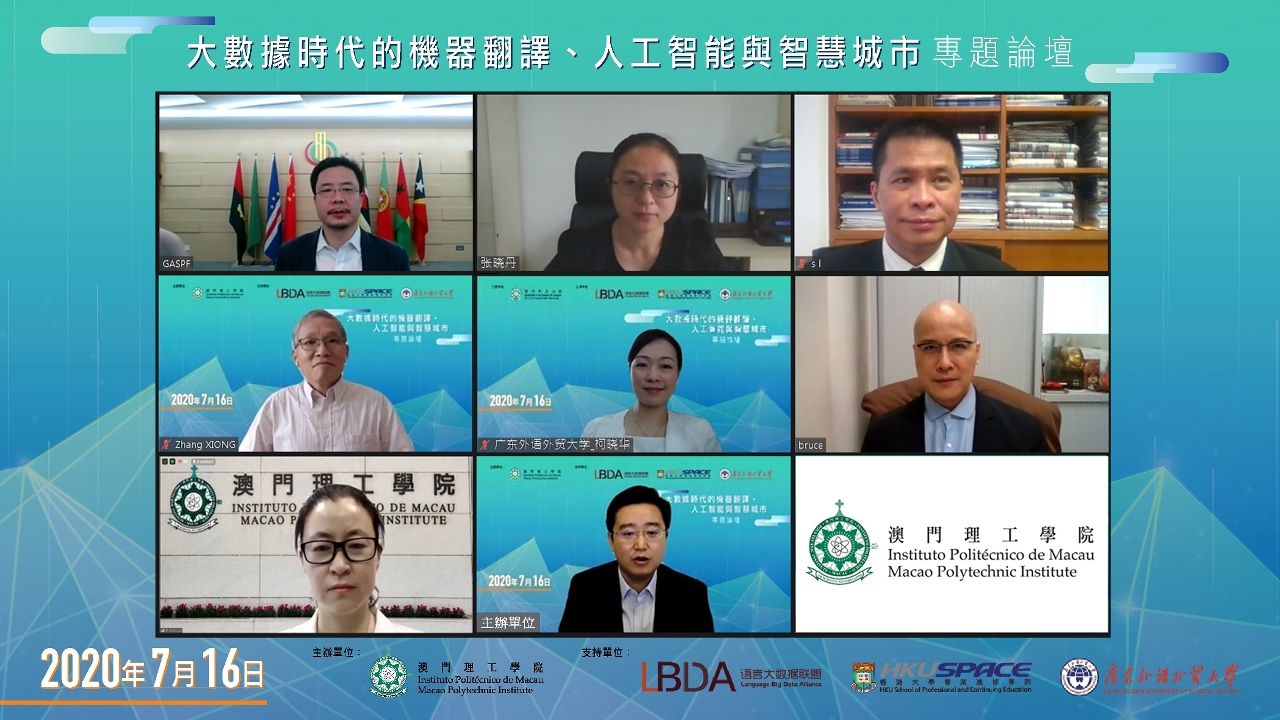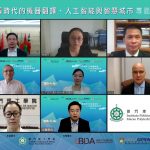 MPI held an online thematic forum on “Machine Translation, Artificial Intelligence and Smart Cities in the Big Data Era”
MPI held an online thematic forum on “Machine Translation, Artificial Intelligence and Smart Cities in the Big Data Era”
In order to dissect the cutting-edge research results of machine translation, artificial intelligence and smart cities in the era of big data, and to apply technology in the construction and development of the Guangdong-Hong Kong-Macao Greater Bay Area and the “Belt and Road” initiative, the thematic forum on “Machine Translation, Artificial Intelligence and Smart Cities in the Big Data Era” was successfully held online on 16 July 2020.
Hosted by Macao Polytechnic Institute (MPI) and supported by the Language Big Data Alliance (LBDA), Guangdong University of Foreign Studies (GDUFS) and Hong Kong University School of Professional and Continuing Education (HKUSPACE), the Forum gathered keynote speakers from Beijing, Guangdong, Hong Kong, and Macao representing the government, academia, and business sectors on the cloud platform to express their opinions, discuss the use of innovative technology to stimulate the construction of the “Platform between China and Portuguese-Speaking Countries” (hereinafter the “Platform”) and the creation of the “Smart Bay Area”. The forum attracted more than 100 interested parties from the United Kingdom, Portugal, Australia, South Korea, Hong Kong, Macao, the Mainland and many more; translators of governmental units and departments in Macao, as well as academics, researchers and practitioners from higher education, banks and the business sector participated in this forum.
Invited keynote speakers included Ding Tian, Deputy Secretary-General of the Permanent Secretariat of the Forum for Economic and Trade Co-operation between China and Portuguese-Speaking Countries (Macao); Zhang Xiaodan, Elena, Vice President of Global Tone Communication Technology Co., Ltd. (GTCOM); Lo Sonny S.H., Deputy Director of Arts and Sciences of HKUSPACE; Ke Xiaohua, Director of theOfficeofHong Kong, Macao and Taiwan Affairs of GDUFS; Xiong Zhang, Director of the Ministry of Education Advanced Computer Application Technology Engineering Research Center, School of Computer Science and Engineering, Beihang University; Bruce S.N. Cheung, Head of the College of Life Sciences and Technology of HKUSPACE; and Luo Wuman, Associate Professor of the School of Applied Sciences of MPI.
Ding Tian pointed out that it is Macao’s mission to build a platform to bridge China and Portuguese-speaking countries. The emergence of machine translation technologies such as the Chinese-Portuguese machine translation system of MPI has maximized the linguistic advantages and has tightened Macao’s connection with China and Portugal, which has become “an ace in the hole” for the development of the “Platform”. Elena Zhang believed that the construction of an international smart city has gradually become a common choice for countries and regions along the “Belt and Road”; integrating language technology with city planning, construction, management and services is the way to truly realize the globalization and intellectualization of a city. Ke Xiaohua proposed to enhance the efficiency of machine translation from evaluating the quality of the output of machine translation, to improve the efficiency of knowledge management through the combination of AI machine translation and intelligent voice modules, and to connect with the world while keeping a foothold in the Guangdong-Hong Kong-Macao Greater Bay Area.
Sonny Lo indicated that the Greater Bay Area is closely related to the development of big data, which is a major tool for the social and economic integration of Guangdong, Hong Kong and Macao, and it has made important contributions and achieved breakthrough development for the integration of the three regions. Xiong Zhang stated that the development of the Internet of Things and smart cities is an important means to enhance national competitiveness and urban governance, a significant way and measure to promote industrial transformation and structural adjustment, as well as the major battlefield for independent innovation of information technology in the new-generation. Bruce Cheung mentioned that Guangdong, Hong Kong, and Macao have gradually entered a new era of 5G; the three regions are continuously deepening electronic technology in the areas of urban life, administration, business, tourism, transportation, etc., building a more efficient and convenient smart city, and integrating into the Smart Bay Area. On the basis of comprehensively demonstrating MPI’s achievements in the research and development of machine translation, Luo Wuman proposed that machine translation can be widely applied in the construction of smart cities such as government services, education, and economic industries, and that the application of artificial intelligence will make the cities smarter.
The Forum on “Machine Translation, Artificial Intelligence and Smart Cities in the Big Data Era” was organized by the MPI Engineering Research Centre of Applied Technology on Machine Translation and Artificial Intelligence, Ministry of Education. It focused on how to use technological innovation as the driving force to lead the development of regional scientific and technological innovation, and to assist in the development of an international centre of science and innovation in the Guangdong-Hong Kong-Macao Greater Bay Area. Having the first engineering research centre of the Ministry of Education in Hong Kong and Macao and being based in the Guangdong-Hong Kong-Macao Greater Bay Area, Macao fully utilizes its geographical advantages as the heart in the Bay Area. With the cutting-edge innovations in artificial intelligence, machine translation and other related fields, Macao actively participates in constructing a corridor of innovative technology for Guangdong-Hong Kong-Macao; in expanding scientific and technological cooperation with Guangdong and Hong Kong, particularly in the promotion of talent exchange and the coordination of scientific research; in further integrating the Guangdong-Hong Kong-Macao Greater Bay Area with the overall national development by deepening the construction of the “Platform” and the “Smart Bay Area”; and in continuously facilitating and advancing the development of technological innovation cooperation between China, Portuguese-speaking countries and the “Belt and Road” countries.


